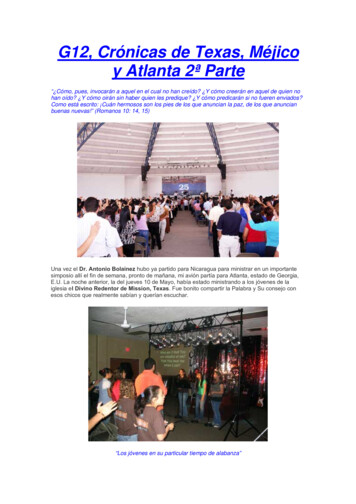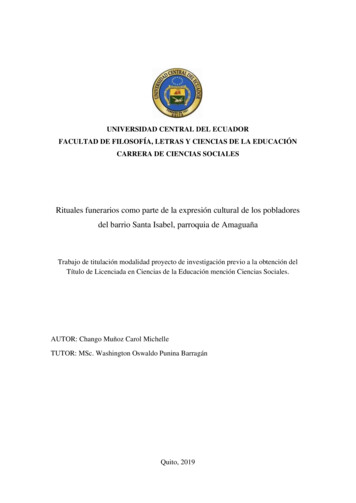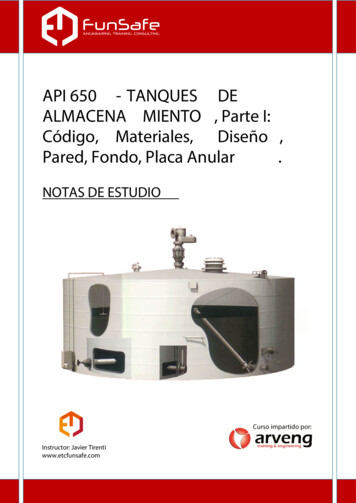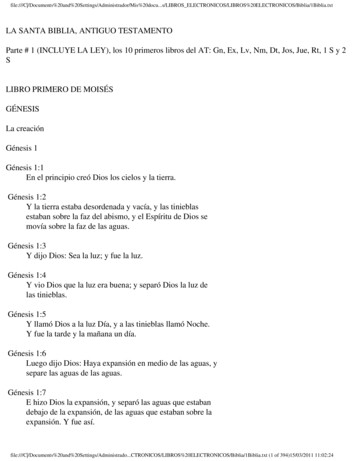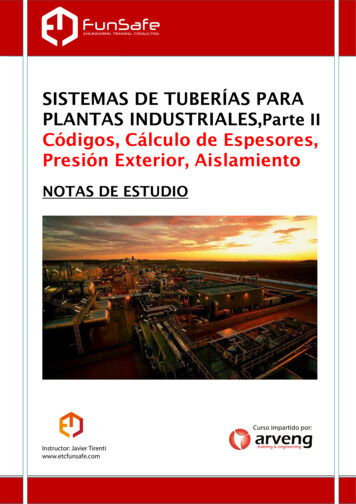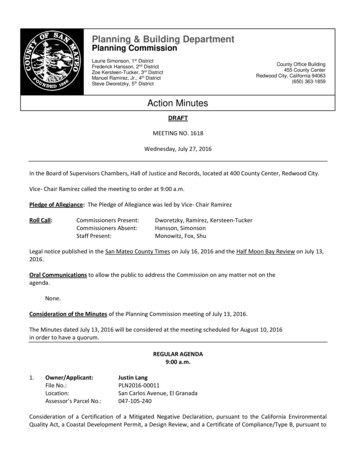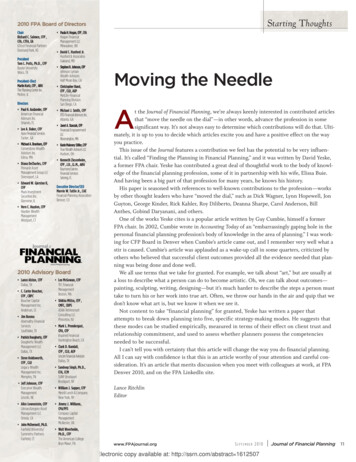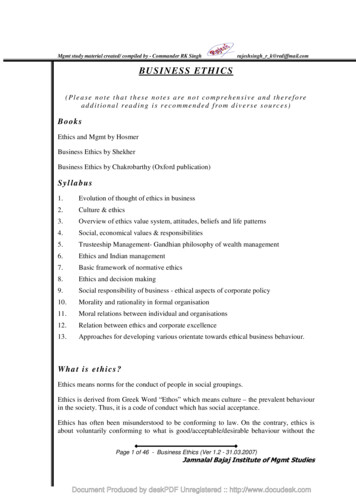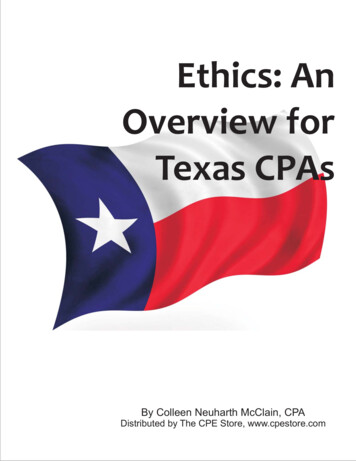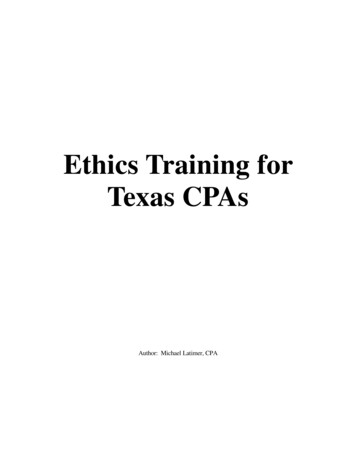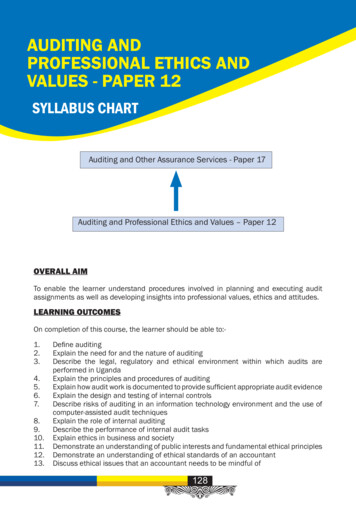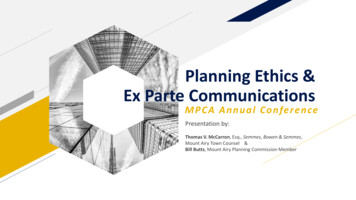
Transcription
Planning Ethics &Ex Parte CommunicationsM P C A A n n u a l C o n fe r e n cePresentation by:Thomas V. McCarron, Esq., Semmes, Bowen & Semmes,Mount Airy Town Counsel &Bill Butts, Mount Airy Planning Commission Member
FRWhat is Ex Parte Communications?In Latin, Ex Parte means: “from one side only, with the other side absentor underrepresented” When decision-making processes (e.g., in localgovernment) give the appearance, real orimagined, of being one-sided or prejudiced, andtherefore, full due process is not provided to thepublic.2
FRWhen Does Ex Parte Occur in Planning? When our behavior as local planners is not fullypublic and/or we actually consider less than all sidesof the issue before us (or we’re perceived to do so).or We make up our mind prematurely about an issueeither currently before the PC or about to comebefore us.3
Why it mattersP C J : O U R P L A N N I N G R E S P O N S I B I L I T I E S & O B L I G AT I O N S * To be fully aware of and follow state and local code To be well-informed about all aspects of the issuesbefore us and to educate ourselves in advance of commission discussion To provide honest, open, equitable and respectfulconsideration for all public opinion and points of view To ensure our consideration & the commission’sdiscussion is open & multi-sided, rather than one-sided*A summary of priorities reflected in PlanningCommissioners Journal articles over 25 years
Ethical Principles in PlanningA s a d o p t e d b y t h e A PA B o a r d , M a y 1 9 9 2Section I The planning process must continuously and faithfullyserve the public interestSection II PPP’s continuously strive to achieve high standards ofintegrity & proficiency so that public respect for the planning process will be maintainedSection III PPP’s continuously pursue improvement in theirplanning competence
Why it mattersL E G A L C O N S I D E R AT I O N S PC is a Governing Body which must abide byMaryland State Law Role of Planning Commission Review of Development PlansCommercial v. ResidentialSignage and “look”Transportation and other Public Facilities Quasi-Judicial Decisions Appealable to the Circuit Court
FRRules of ProcedureADOPTION BY THE PLANNING COMMISSION Land Use Article of the Maryland Code (“LU”) § 2-105(a)(1):A planning commission shall have the powers necessary toenable the commission to fulfill its functions, promoteplanning, and execute the purposes of this division. Land Use Article of the Maryland Code (“LU”) § 2-105(c)(1):A planning commission shall adopt rules for the conduct of itsbusiness and keep records of its resolutions, transactions,findings, and determination.7
FRFundamental FairnessD U E P R O C E S S C O N S I D E R AT I O N S“When the deprivation of a property interestis at stake, the deprivation must be precededby notice and opportunity for hearingappropriate to the nature of the case [. . .]Moreover, procedural due process requires afair trial in a fair tribunal. [ ] Such principlesapply to any tribunal, be it a judge, jury, or anadministrative body ”EqualOpportunity rontWitnessesRegan v. Bd. of Chiropractic Examiners, 120 Md. App. 494, 510, 707A.2d 891, 899 (1998), aff'd sub nom. Regan v. State Bd. ofChiropractic Examiners, 355 Md. 397, 735 A.2d 991 (1999)(internalcitations and quotations omitted).8
FRFundamental FairnessD U E P R O C E S S C O N S I D E R AT I O N SThe Supreme Court identified the three factors to be considered when courts addressprocedural due process issues in administrative settings. Courts must consider:First, the private interest that will be affected by the official action;Second, the risk of an erroneous deprivation of such interest through theprocedures used, and the probable value, if any, of additional or substituteprocedural safeguards;Finally, the Government's interest, including the functioninvolved and the fiscal and administrative burdens that theadditional or substitute procedural requirement would entail.Mathews v. Eldridge, 424 U.S. 319, 335, 96 S.Ct. 893, 903, 47 L.Ed.2d 18 (1976)9
FRFundamental FairnessD U E P R O C E S S C O N S I D E R AT I O N SHowever, the level of due process required must be decided based onthe circumstances of each individual case.Regan v. Bd. of Chiropractic Examiners, 120 Md at 899.Moreover, Courts will not find a violation of due process solely because of the agency’s failure toabide by procedural or statutory requirements absent a causal relationship between the failure andthe alleged due process injury.“[A statutory] violation, by itself, however, d[oes] not constitute a lack of dueprocess or preclude the Commission from proceeding to carry out its publicduties. Due process is concerned with fundamental fairness in the proceeding,not with whether the agency has failed in some way to comply with a statutoryrequirement.”Calvert Cty. Planning Comm'n v. Howlin Realty Mgmt., Inc., 364 Md. 301, 322 (2001) (citingMaryland State Police v. Zeigler, 330 Md. 540, 559 (1993).10
Possible Ex Parte Situations – You Decide Example #1: The “Reasonable Person Test” Example #2: Behind the Scenes Advocacy Example #3: Two Planning Commissioners are Talking . Example #4: The Town Council liaison to your PC hashistorically been a voting member of the PC
FRThe Verdict on Ex Parte: 8 Concerns Can prejudice the minds of decision makers Prevents full disclosure of information to all interestedparties to the case Violates the public’s right to know Prevents a complete record Can invalidate a decision Can destroy public confidence in PC decisions Must be disclosed and the issue(s) reported12
FRLegal ConcernsW I T H / W I T H O U T E X PA R T E R U L EScope of Role Only in Quasi-Judicial capacity? Can you appeal on ex partecommunications if no rule? Ex officio members?When and WhatConflicts of Interest How to determine existence? What is the relationship between PCMember and ex parte communicator? Automatic Recusal or Disclosure? Scope of Disclosure: Public, to all parties, toentire committee? How recent? Exact subject matter or general ideas? Same property? Same Business or Development? Abuse of Rule by communicators/publicEnforcement/Remedy Self-policed voluntary recusal orcommittee discussion withpotential consequences Disclaimer on communications?
FRCase LawE X PA R T E C O M M U N I C AT I O N S W I T H P C“Who” matters:Applicant’s counsel recommended, in communications to Planning Board staff, language for a wetland variance in aresolution adopting a preliminary sub-division plan, which had been previously voted on and approved. CircuitCourt ruled this was not an ex parte communication because it was made to Planning Board staff. Moreover, boththe Applicant and Petitioner could have engaged in a discussion with the Planning Board regarding recommendedlanguage to go in the resolution.CHARLES COLAO, M.D. v. PG Cnty. PLANNING BOARD: No. CAL03-23736, 2004 WL 5257865 (Md.Cir.Ct. Dec. 23, 2004)Substance matters:Planning Board submitted rezoning application. A Planning Board Member participated in public “work session”with the County Council to discuss reclassification of various parcels of land. “Work session” date and time wasannounced at the end of last Commission hearing. Member’s participation was not found to be a violation ofappellant’s right to proper hearing, however, the Court did note that the Member’s participation was limited asit only “a review of the history of the application and some technical advice.”Potomac Valley League v. Cty. Council for Montgomery Cty., 43 Md. App. 56 (1979)14
FRCase LawO T H E R A D M I N I S T R AT I V E A G E N C I E SWhat’s on the Record matters:After holding a hearing, the Board of Zoning Appeals received a report from the Baltimore County PlanningCommission which consisted of new and additional evidence (not on the public record) from an independent source.The Zoning Board admitted to relying most heavily on this report in making its decision. Court found that proceduraldue process was denied because the parties had no opportunity to challenge the reports opinions.Temmink v. Board of Zoning Appeals, 205 Md. 489 (1954).Classification of Action matters:When Assistant Insurance Commissioner received charts from and engaged in a discussion with a staff specialistduring a hearing on the validity of an insurance program, the Commissioner had not engaged in ex partecommunications, even when the parties had not had an opportunity to review or rebut the information, becausestaff specialist did not represent either of the parties but was instead there to assist the Commissioner. Further,the Court found that the Insurance Commissioner had not engaged in an impermissible blending of hisinvestigative, prosecutorial, and judicial functions.Nationwide Mut. Ins. Co. v. Ins. Com'r, 67 Md. App. 727(1986).15
FRCase LawO T H E R A D M I N S I T R AT I V E A G E N C I E SAction or Solution may vary:When Secretary of the Department of Personnel of Maryland considered a letter which was notpart of the hearing record in modifying a decision made by the Department of Health and MentalHygiene prior to issuing a final order, improper ex parte communications had been considered andappellant was entitled to a hearing to determine the impact of the letter on the decision.Eaton v. Rosewood Ctr., 86 Md. App. 366 (1991).16
Enforcement/RemedyH O W T O R E V I E W A N D R E S O LV E C O N F L I C T S Should board members “disclaim” their obligations in writtencommunications with constituents? Consider whether parties can raise the issue of board memberrecusal or impartiality based on relationship or ex partecommunications How to determine impartiality: Personal or familial relationshipFinancial investment or relationshipSubstantial knowledge or material witnessPublic statements made by member
Enforcement/RemedyH O W T O R E V I E W A N D R E S O LV E C O N F L I C T STo disclose, recuse, or disqualify Public Officials must generally recuse themselves from participation inany actions to which they or their direct relative, have a financial,ownership, or employment interest. See. Md. Code § 5-501. Judges who inadvertently receive an unauthorized ex partecommunication bearing on the substance of the matter shall notify allparties immediately of the substance of the communication and providethe parties with an opportunity to respond. ABA Rule of Judicial Conduct2.9 (b). What if communication was made knowingly and purposeful?
Voting by Ex officio MemberMaryland Code, Land Use Article, § 2-102(a)(a)(1) Except as otherwise provided in this division, a planning commissionestablished under this subtitle shall consist of three, five, or seven members.(2) One member of the planning commission may be a member of thelegislative body, who serves as an ex officio member concurrent with themember's legislative term.(3)(i) An ex officio member of a planning commission may not voteon any question in the result of which the ex officio member has animmediate personal or financial interest.(ii) When an ex officio member abstains from voting on a questionunder subparagraph (i) of this paragraph, the ex officio membershall disclose the recusal. Rule discusses conflicts of interest but notnecessarily ex parte communications!
Carroll CountyCharles CountyEagle Harbor TownshipCity of FrederickFrederick CountyHoward CountyEx Parte Rule Survey MiddletownMontgomery CountyPrince George’s CountyRockvilleTown of CheverlyWalkersville
JurisdictionPlanningCommission RuleLanguageCarroll County4.2 Ex ParteCommunicationsA communications process in which an interested party is not informed of the time, or place, orlocation of the communication, or that a communication process was going to take place;consequently, the interested party is not afforded an opportunity to participate. These types ofsituations are typically viewed as showing favoritism or prejudice and can give rise to claimsand/or perceptions of unfairness or bias.(a) When the Commission is adjudicating a matter in its quasi- juridical role, ex partecommunications are strictly forbidden. The Commission is acting in a quasi-judicial role when ithears zoning map amendment petitions, text amendments, and reviews applications andrequests under the provisions of Article XV: Land Use.(b) When the Commission is acting in its legislative role, ex parte communications arediscouraged and should, to the extent possible, be avoided. The Commission is acting in itslegislative role when it participates in plan development and implementation activities or when itreviews items or business not associated with the review or enforcement of the provisions ofArticle XV: Land Use. Members receiving ex parte communications shall advise all Commissionmembers through the Secretary’s office prior to the meeting or make a statement in person atthe Commission meeting. An ex parte communication received relevant to the Commission’sresponsibilities shall be furnished to all Commission members and the public orally or in writing.As an alternative to ex parte communications, members should encourage the public to preparewritten reports for all members through the Secretary’s Office or to speak publically at theCommission meetings.
JurisdictionPlanningCommission RuleLanguageCharles County2. Rules againstEx ParteCommunicationsEx Parte communication is improper and may provide legal grounds for overturning a decision.(a) Members receiving ex parte communications shall advise all Commission members throughthe Clerk’s office prior to the meeting or make a statement in person at the Commission meeting.(b) Any ex parte communication received shall be furnished to all Commission members and thepublic orally or in writing.(c) As an alternative to ex parte communications, members should encourage the public toprepare written reports for all members through the Clerk’s office or speak publicly at theCommission meetings.Eagle HarborTownshipH:1: Specialconsiderationsand duties for allmember: Ex Parte(a) Members shall avoid Ex Parte contact about cases where an administrative decision is beforethe commission whenever possible(b) Despite one’s best efforts it is sometimes not possible to avoid Ex Parte contact. When thathappens, the member should report to the Commission at a public meeting or hearing what wassaid, so that every member and other interested parties are made aware of what was said.City of Frederick6.5 Ex ParteCommunicationsProhibitedAn ex parte communication includes an oral or written communication not on the public recordto which reasonable prior notice to all parties is not given. Such communication betweenCommission members and interested persons is prohibited if relevant to the merits of aCommission proceeding. Members should not discuss applications with applicants or otherinterested persons outside the confines of a public meeting, but should recommend that theperson(s) contact Staff with any questions or concerns.
JurisdictionPlanningCommission RuleLanguageFrederick County5.5 Ex ParteCommunicationsIt is important to maintain the impartiality and integrity of the Commission; it is also importantthat Commission decisions be based on information presented in public documents and duringopen and public meetings. Therefore, Commission members shall refrain from ex partecommunications . . . regarding matters that are likely to come before the Commission fordecision. If a Commission member receives an unsolicited communication(s) about a pendingapplication or decision outside of a Commission meeting, the member must disclose and describethe communications at the earliest opportunity during the Commission’s consideration of theapplication or decision. . .Howard County9. Ex ParteCommunicationOutside of the hearing, the Planning Board or its members may not communicate with anyperson who is a party or receive any communication from any such person regarding any matterrelevant to the merits or the law of a pending or proposed petition. Any request for informationconcerning a pending or proposed petition should be directed to the Executive Secretary ofdesignee.MiddletownEx ParteCommunicationMaryland law and the Planning Commission’s Rules of Procedure regarding an ex partecommunication require all discussion, review and consideration of the Commission’s businesstake place only during the Commission’s consideration of the item at a scheduled meeting.Telephone calls and meetings with Commission members in advance of the meeting are notpermitted. All communications will be directed to appropriate staff members for response andincluded in briefing materials for all members of the Commission.
JurisdictionPlanningCommission RuleLanguageMontgomeryCounty3.2 OutsideCommunications3.2.1 Policy:To preserve public confidence in the fairness of Planning Board Deliberations, the Planning Boardshould ensure that the public and interested Persons have the opportunity to know and considerany relevant evidence provided to any of the other Planning Board members; provided that thePlanning Board may take administrative notice of matters in common knowledge, or mattersfalling within the experience and expertise as disclosed by any member in reaching a decision ona case. The Planning Board’s ex parte rules do not apply to non-regulatory matters.3.2.2. Planning Board’s Obligation to Avoid:When considering any of the matters decided according to these Rules, the Planning Board dealswith Persons who are directly affected by its decision. . . Each of these interested Persons needsthe assurance that other interested Persons will not have unfair advantage in presenting theirversion of the relevant facts or concerns to the Planning Board. In such cases, therefore, PlanningBoard members must avoid communicating with Applicants or any other Persons about a pendingApplication except at the Planning Board meetings at which the Application is considered. . . .(continued on next page)
JurisdictionPlanningCommission RuleLanguageMontgomeryCounty(continued)3.2 OutsideCommunications(continued)(continued from previous page)3.2.3. Prohibitions:Planning Board Members are strictly prohibited from communicating with any Person other thanPlanning Staff or another Board Member about the merits of any pending Application or allegedViolation except during the Planning Board meetings at which the Application or alleged Violationis being considered. In the event the Planning Board attempted to communicate with a memberof the Planning Board in violation of this Rule, the Planning Board may impose an appropriateremedy, including, without limitation, deferral of the Planning Board Action concerning thatApplication for a period of up to six months or exclusion of any testimony by the Person from therecord of the matter to which the prohibited communication pertained.3.2.4 Disclosure of Unsolicited Communications:If a Planning Board member receives unsolicited communications about a pending Application oralleged Violation outside of a Planning Board meeting, the member has the duty to disclose anddescribe the communications during the public hearing for the Board’s consideration of theproposal.
JurisdictionPlanningCommission RuleLanguagePrince George’sCountySection 9 –Ex ParteCommunication(a) A member of the Planning Board may not communicate ex parte, or outside of the record,with any person regarding the merit of a pending contested case. The members may, however,communicate with each other, staff or with legal counsel.(b) Any member of the Planning Board who receives an ex parte communication in violation ofsubsection (a) shall place on the record all written communications received, a memorandumstating the substance of all oral communication received and responses made, and shall arrangenotification to all parties of record that such communication has been filed. Any party desiring tor
Oct 26, 2018 · Regan v. Bd. of Chiropractic Examiners, 120 Md. App. 494, 510, 707 A.2d 891, 899 (1998), aff'd sub nom. Regan v. State Bd. of Chiropractic Examiners, 355 Md. 397, 735 A.2d 991 (1999)(internal citations and quotations omitted). Present Rebuttal Confront Witness
